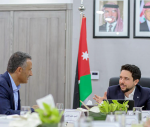You are here
Reform is a top Royal priority
Aug 12,2014 - Last updated at Aug 12,2014
For the umpteenth time, His Majesty King Abdullah has reiterated that he would not allow regional developments to obstruct Jordan’s ongoing reform process, which has already crossed a long way since it was launched a decade and a half ago.
“Every time I am faced with a similar question my answer is always and unequivocally the same: We will not allow using difficult regional challenges — be they the Israeli aggression on Gaza, the conflict in Syria, the turmoil in Iraq or the danger of extremism — as an excuse to hesitate or regress in the reform drive,” the King affirmed in his interview with Al Ghad daily, published Sunday.
The country’s reform process has been progressing gradually and bearing fruit, starting with national dialogue committees, some of which started way before the so-called Arab Spring, to prepare the foundation for improving political and economic life in the country, by deed, not words.
This homegrown process, which, in view of developments in other countries, proves its prudence, has already witnessed amendment of more than one-third of the Constitution, the passage of laws governing political life, and the birth of the Independent Elections Commission and the Constitutional Court.
Among the milestones were parliamentary elections, meant to start parliamentary governments in the country, leading the way to the formation of the current government after lengthy consultations with parliamentarians.
The next step will be municipal polls and the enhancement of the decentralisation process.
All of this is being done by the Jordanian people, through their representatives and leadership, as part of an evolutionary process that is intended to push forward the democratic march, empower Jordanian citizens, improve the economic situation and, most importantly, fortify the country which, ever since its birth almost a century ago, has been overcoming challenges of all sorts.
These challenges have rather strengthened Jordan than deterred it from continuing to build on achievements.
Those who shed doubts on the country’s democratic march, be they in the media or Amman’s political circles, have their personal reasons or agendas, trying to promote themselves and achieve personal gains.
The King frankly tackled this issue and advised the public to focus the debate on the national reform drive, and not be distracted by “unproductive rumours”.
His Majesty said that in his continuous interactions with Jordanians from all walks of life, in various parts of the country, he has sought practical steps to enhance the democratisation process and improve the lot of Jordanians.
He emphasised that the final goal and the way forward are clear: “The goal is to reach an advanced state of parliamentary governments where the party-based parliamentary majority with clear programmes is entrusted with forming governments, and the minority — also made up of political parties with clear programmes — takes on the role of a shadow government in monitoring performance and suggesting alternative programmes.”
The way to this goal is through enhancing the modus operandi of parliamentary blocs, which received a boost with the recent amendments to the House’s internal by-laws, along with the need to continuously develop nationally based political parties with platforms, the King explained.
Thus, nothing should impede the ongoing reform process, which continues to be a Royal priority based on the people’s vision with the objective of building a better Jordan.












